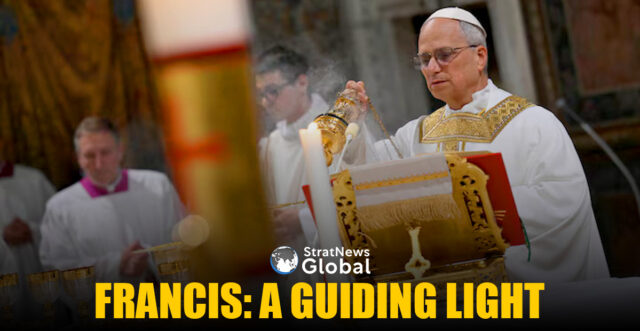Pope Leo XIV signalled on Saturday his intention to continue Pope Francis’s vision and reforms, calling his predecessor’s work a “precious legacy” that must be upheld.
In his first meeting with all the cardinals since his election as pontiff on May 8, Leo also asked the senior clerics to renew their commitment to major Church reforms enacted by the landmark Second Vatican Council in the 1960s.
Leo said Francis, who died on April 21, broadly had a vision of opening the staid 1.4-billion-member Church to the modern world, had left an “example of complete dedication to service”.
“Let us take up this precious legacy and continue on the journey,” the new pope told the cardinals.
The pontiff also asked the clerics to “renew together our complete commitment” to the reforms enacted by the Council, which included celebrating the Mass in local languages rather than Latin and pursuing dialogue with other religions.
Francis: A Guiding Light
He cited Francis’ focus on “courageous and trusting dialogue with the contemporary world in its various components and realities”.
Francis was pope for 12 years and often garnered criticism from conservative cardinals, who said he was watering down the Church’s doctrine on issues such as inclusion of LGBT Catholics and women’s leadership.
Leo, the former US Cardinal Robert Prevost, was a relative unknown on the global stage before his election as pontiff. He had spent most of his career as a missionary in Peru before serving as a senior Vatican official for the past two years.
Honouring His Namesake
The new pope said on Saturday he had taken his papal name partly to honor Pope Leo XIII (1878-1903), who was known as an advocate for social justice and pushed for fair pay and treatment of workers during the industrial revolution.
Leo XIV said the Church must now take the lead in facing newer threats to workers, such as artificial intelligence. He said AI posed “new challenges for the defence of human dignity, justice and labour”.
Leo’s speech came a few hours before he made a surprise visit later on Saturday to a Catholic shrine in Genazzano, about an hour’s drive east of Rome.
The pope was greeted to cheers from crowds gathered outside the Shrine of Our Lady of Good Counsel. He shook hands and offered blessings to a few people in the crowd before entering the shrine.
Breaking From Traditions
Leo’s two-hour meeting with the cardinals earlier on Saturday took a different format to that used by previous popes, who would typically offer a speech and expect the clerics only to listen.
This time, Leo gave a prepared address and then opened the floor to any cardinal who wanted to make a comment — allowing the clerics to voice their opinions and concerns about the main issues facing the global Church.
“He listened very carefully, but he knows he’s going to have to make the decisions,” Irish Cardinal Sean Brady told Reuters. “But we’re here to help him.”
Spanish Cardinal Aquilino Bocos Merino described the meeting as “very cordial and communal”.
China Deal Comes Up
Leo greeted each of the cardinals individually as they left the meeting, which was held in the same small Vatican auditorium where the cardinals had been gathering in the days before the conclave to discuss who should be the next pope.
Czech Cardinal Dominik Duka said one topic that came up was the situation of Catholics in communist China.
The Vatican and China in 2018 signed a controversial deal on the appointment of bishops in the country, which gives Beijing some input into their selection.
Conservatives have attacked the still-secret deal as a sell-out, but Duka told Reuters it was necessary to keep a dialogue open in places where the Church is oppressed, comparing it to dialogue between the Vatican and eastern European countries during the Cold War.
German Cardinal Gerhard Mueller, who openly clashed with Francis on issues concerning Catholic moral teaching, told Reuters that Saturday’s encounter was “very good and harmonious”.
To be elected as pope during the May 7-8 secret conclave at the Sistine Chapel, Leo required a two-thirds majority of 89 of the 133 voting cardinals.
Madagascar Cardinal Désiré Tsarahazana told reporters that Leo received more than 100 votes at the final ballot on the afternoon of May 8.
(With inputs from Reuters)





